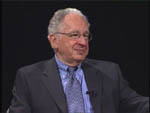
Center for Problem-Oriented Policing
Interview with Herman Goldstein

About This Interview
This interview was conducted in 2005 by historian Samuel Walker, Emeritus Professor, School of Criminology and Criminal Justice, University of Nebraska, Omaha. It was made possible by support from the U.S. Department of Justice COPS Office and Bureau of Justice Assistance.
Part 1: Introduction
Goldstein gives a quick overview of what POP is all about. He contrasts it to the generic model of policing - patrol, investigation, arrest, etc. POP focuses on identifying specific kinds of problems of which there are hundreds by applying the analytical methods of the social sciences. The complex theory underpinning this approach is described in his book Problem Oriented Policing.
Part 1: Introduction WMV 6Mb
Part 2: Origins of Problem Oriented Policing
Goldstein says that a few significant events helped shape his thinking about problem oriented policing. Among these were the American Bar Foundation study and his experience with the Chicago Police Department. However, he has been working on POP for some fifty years and it continues to evolve.
Part 3: The American Bar Foundation Survey
This unique study helped Goldstein understand what was really going on in policing. It uncovered informal and routinized practices of policing and revealed the enormous discretion at their disposal. Goldstein concludes that finding out what is really happening on the street is much more important than studying policies or doing surveys of police organizations. He realized then that if police kept doing what they were doing they would be very limited in the extent to which they could solve the problems they faced.
Part 4: Chicago
In 1960-1964 Goldstein worked with O.W. Wilson who became superintendent of the Chicago Police Department, at that time a police department with many problems. He participated in the total restructure of the Chicago Police Department, an ambitious reform effort. But he knew that there was more that had to be done. Were they any better at dealing with street robberies than before the reform? Were they solving problems? He wanted to go beyond the old professional/efficiency model. The germ of the idea of POP emerged.
Part 4: Chicago WMV 17Mb
Part 5: The President's Crime Commission
In 1964 Goldstein joined the University of Wisconsin Law School. He wrote the Task Force Report on Police for the Commission (1967), focusing on the immense unseen discretion of policing and recommending ways for police departments to structure this into their operations, such as, for example, policies on police use of force. Goldstein described the conflict between those who wanted to confine the police to dealing with "real crime" and only that, and those, himself among them, who argued for a broader role for police to participate in solving many problems in the community.
Part 6: The University of Wisconsin
Goldstein worked with Law School Professor Frank Remington who had directed the American Bar Foundation study. He soon realized that policing must be taught according to the specific problems it faced, because each type of crime has its own issues, constraints, and responses. This was a paradigm shift in law school teaching of criminal law. He also developed a close relationship with the Madison Police Department which became a laboratory for experimenting with problem oriented policing.
Part 6: The University of Wisconsin WMV 32Mb
Part 7: Police Executive Research Forum (PERF)
Gary Hayes, Goldstein's former student, became the first director of PERF, a new professional association for police chiefs formed specifically to promote research in policing. With federal funds, PERF helped the Baltimore County, Newport News, San Diego, and other police departments experiment with problem-oriented policing. The research base of POP was established. The Herman Goldstein Award was established and annual POP conferences were held in San Diego, hosted by the San Diego PD.
Part 8: POP Today
Has POP really taken hold? "Very difficult to answer," says Goldstein. It is difficult to establish continuity and depends greatly on leadership. POP has taken hold more quickly in the U.K., but it is now an international phenomenon. The biggest impediment is the lack of trained crime analysts to assist in research and deep analysis of problems. The POP Center is also working to build a knowledge base for POP. Does POP have a future? Goldstein gives his answer....
Part 8: POP Today WMV 30Mb